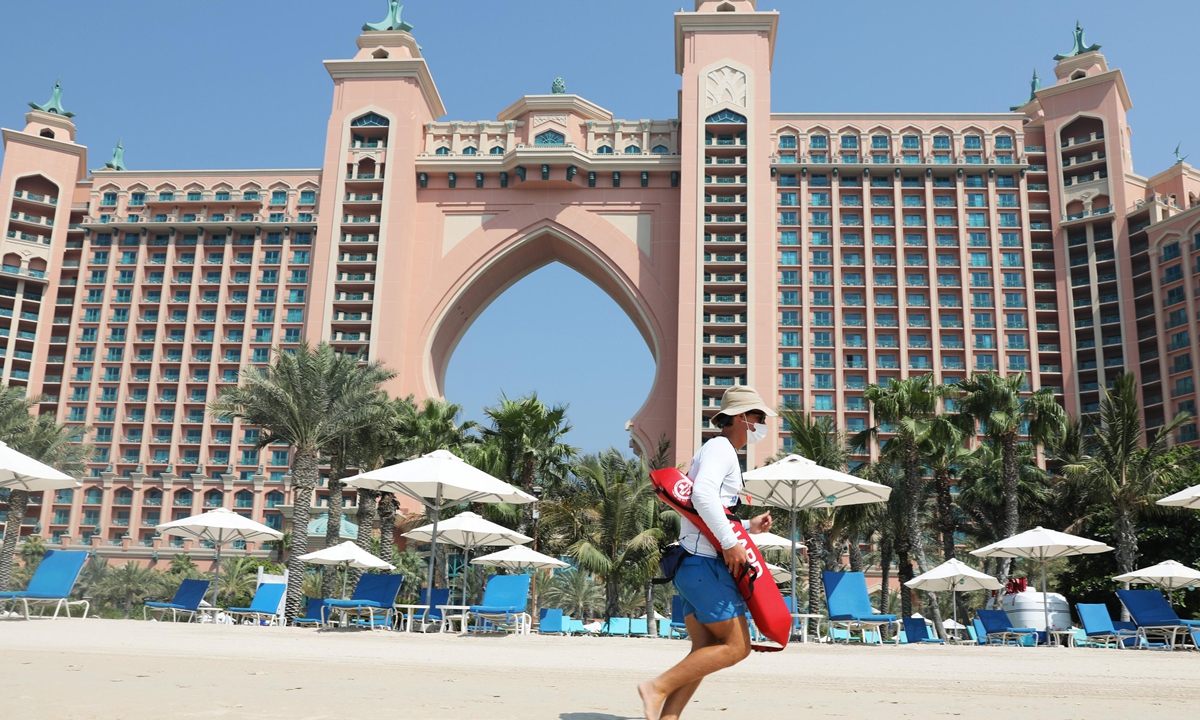Proud achievements from UAE-China ties pave the way for an even brighter future
By Ali Obaid Al Dhaheri Source: Global Times Published: 2020/11/30 18:37:03

A lifeguard wearing face mask walks through the Dubai's iconic island resort, Atlantis, The Palm, on July 7. Photo: Xinhua
2020 has proven to be a uniquely tumultuous year, with the COVID-19 outbreak bringing unprecedented challenges for human health, economic performance, and global stability. Despite these ongoing barriers, the United Arab Emirates (UAE) has worked energetically to strengthen its economic and international footprint; celebrating its rich history and looking optimistically to the future.
The UAE's partnership with China and engagement in the Belt and Road Initiative (BRI) have been prominent features of the UAE's progress in recent years.
On December 2, the UAE celebrates its 49th National Day - showcasing our country's vitality and success. Since the founding of the UAE in 1971, our country has flourished. Our economic output has grown more than eight times over since the 1990s, and GDP per capita has exceeded $40,000.
Establishing a solid partnership
Next year, the UAE will celebrate our 50th anniversary; our golden jubilee. The UAE and China will also mark the 37th anniversary of the establishment of diplomatic relations. President Xi Jinping's 2018 state visit to the UAE and the visit of His Highness Mohammed bin Zayed bin Sultan Al Nahyan, Crown Prince of Abu Dhabi and Deputy Supreme Commander of the UAE Armed Forces to China in 2019 helped to usher in a golden age for bilateral relations.
With President Xi's fruitful 2018 state visit, our two countries upgraded bilateral relations, forging a comprehensive strategic cooperative partnership. The scope of this partnership has since grown to encompass cooperation in areas such as climate change, innovation and technology, food security, energy security, financial services, education, and international humanitarian assistance. There have been more frequent cultural and people-to-people exchanges.

His Excellency Dr Ali Obaid Al Dhaheri, Ambassador of the United Arab Emirates to the People's Republic of China Photo: Courtesy of the UAE Embassy in Beijing
Belt and Road Initiative
The UAE has long valued and prioritized its cooperation with China. The UAE was among the first to join the BRI, and now serves as a key regional logistics and connectivity hub in the Middle East. The UAE has become an important gateway for China to enter West Asia and North Africa. More than 60 percent of China's trade in this region now transits through the UAE.
The UAE's seaports and free trade zones (FTZs) demonstrate the efficacy of bilateral cooperation, as they facilitate global and regional trade. The World Shipping Council reports that two of the world's top 50 container ports are in the UAE, with one ranking among the top 10.
Both the Chinese and the Emirati economies have benefitted from BRI cooperation. At present, trade volume between China and the UAE is at $48 billion. Last year, both heads of state expressed a desire to expand bilateral trade to $200 billion by 2030. There are now more than 6,000 Chinese companies investing or conducting business in the UAE, and the UAE has participated in more than 650 projects in China. At present, China is the UAE's largest trading partner, and the UAE is China's largest export market and second largest trading partner in the Middle East and North African (MENA).
Innovation and technology
UAE-China cooperation is supported by the UAE's economic and scientific strengths. The UAE has translated wealth in natural resources into investments in world-class infrastructure, high quality public education, and innovative healthcare services, among many other areas; serving as a global leader in MENA and beyond. In recent years, the UAE has prioritized economic transformation.
In 2017, the UAE Strategy for the Fourth Industrial Revolution articulated our nation's vision to use technological innovation as a pathway to prosperity. Based on this strategy, the UAE is quickly building its digital economy, creating more foreign investment opportunities and strengthening economic security by adopting cutting-edge fintech solutions. The UAE has also launched Vision 2021, which will see the UAE develop a more sustainable and diversified economy within the next year.
The UAE's advanced technologies support scientific innovations in many fields, breaking records in space exploration and sustainable energy. In July 2020, the UAE became the first MENA country to launch a mission to Mars. By 2024, the UAE plans to launch the "Rashid" lunar probe, which will also be the first of its kind in the Arab world. In addition, the UAE also completed construction on the first ever nuclear power plant in MENA this year. The Barakah nuclear power plant is intended to meet 25 percent of the UAE's energy needs.
Coordination on COVID-19
When faced with the COVID-19 outbreak, our countries extended much needed cooperation in medicine and healthcare, with particular focus on vaccine research and development. 31,000 Emirati volunteers participated in clinical trials, supporting innovative medical solutions to this deadly virus. On November 3, several Emirati government officials, including His Highness Sheikh Mohammed bin Rashid Al Maktoum, Vice President and Prime Minister of the UAE and Ruler of Dubai, were vaccinated with a newly prepared COVID-19 vaccine produced by the Chinese firm Sinopharm.
Moving forward, the UAE and China will continue to extend our areas of cooperation. With the BRI as a key platform, our countries will eagerly increase joint contributions to mutual prosperity.
On this UAE National Day, there is much satisfaction with the progress that has been achieved in recent years, with both our nations' development and with China-UAE bilateral relations. There is also an expectation that much more can be achieved in the years ahead for realizing bright futures for our two countries.
The author is the Ambassador of the United Arab Emirates to the People's Republic of China
Posted in: ECONOMY